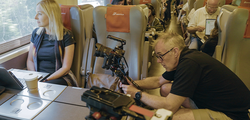Tonight I’m introducing my film Hackers at the Hackney Picturehouse for a late night screening. It’s also screening on Saturday, but this will be the last of a quite unexpected mini re-release to mark the 20th anniversary of the first showing of the film in 1995. A month or so ago Andrew [Chowns, Directors UK CEO] suggested that I might write a blog about the process that resulted in these screenings, so, rather late in the day, I’m sharing a few interesting discoveries with Directors UK members. Above all, the importance of nurturing relationships with independent cinemas.

Since the first anniversary screening in August, the film has had 25 showings in a dozen cities in the US and, following two shows at the Prince Charles a fortnight ago, four screenings were booked by Picturehouse, at the Ritzy last weekend, as well as this weekend’s Hackney shows.
The whole idea for the screenings only emerged a few months ago, when I was asked to contribute bonus materials for a Hackers Blu-ray release. Perhaps the crucial moment was when film critic Mark Kermode came to Directors UK in April to record his own contribution to the Hackers DVD. Mark asked me in return to be interviewed about Hackers for his Kermode Uncut video blog. That evening the “Vlog”, complete with clips, went on YouTube and BBC Online and got a high number of hits. Mark has always been a very generous champion of the film and, at the time of the film’s release, champions in the press were hard to come by! Mark’s sign off was a plea for someone to do an anniversary theatrical screening of the film.
So, armed with that support, I forwarded the link to the vlog to Jonathan Glickman who runs MGM, the company that now holds the rights to Hackers. I asked Jonathan for his support for one or more cinema showings in either New York or London, both cities where we shot the film. Jonathan in turn put me in touch with Nick Varley at Park Circus, an Edinburgh based company who handle and promote the back catalogue for MGM, Sony and other studios. Nick made it clear that in the US, the theatres would need to be approached one by one, and may want some “talent” attendance to secure screenings. By now, the Prince Charles in the West End had also booked the film and were keen to make the screening into an event.
I learned two really useful lessons in this process. As far as independent cinemas go, the staff and programers are film enthusiasts who are really motivated by engaging with the filmmakers. At the Alamo Draft house in Denver, I recorded an interview via Skype which was screened before the show, and then passed on to Alamo screens in other cities. For the screening at the Cinefamily in LA, cast member Matthew Lillard introduced the film. In the New York Nitehawk cinema, I joined many of the cast including Jonny Lee Miller on stage after the screening. The story was the same at The Prince Charles, where department heads John Beard (production designer), Chrissie Blundell (make-up artist) and Martin Walsh (editor) joined me on stage.
In all these cinemas, the programmers were very keen to maintain links. Many wanted to put on further screenings. There surely is an opportunity here for directors to establish and reinforce relationships with cinema owners. This is something that the Directors UK Film Commitee are keen to develop and we are convinced that the exhibitors will welcome this. Hackers is not a “classic” film and at the time it came out it didn't do particularly well at the box office and reviews were decidedly mixed but it did have its fans. Some audiences who maybe saw the film online or on TV took it to their hearts and have welcomed the chance to see the film on the big screen, projected from original 35mm prints.
Indeed the fact that the films have been showing on 35mm prints has been an active part of the branding of the screenings and has attracted audiences to the cinema. In fact were it not for the existence of these prints it is likely that this mini re-release would never have happened. I don’t think I could have convinced anyone to pay for a DCP to be made. Even if DCP technology had existed at the time of our release, we would still have had to remake new DCPs. Quite apart from the likelihood that the specs of digital projectors would have changed in that time, the DCP drives themselves would have failed after about 15 years. Crucially, we were lucky that so many cinemas in the US still have film projectors, and projectionists. This is one of the issues surrounding the film/digital debate that Chris Nolan has highlighted and it is something that all film makers need to be aware of. There are a number of inter-related points. It seems that we should make every attempt to archive our work on film. However, as was the case with films like Hackers that only exist as 35mm prints, we need projectors and projectionists to show our past body of work. Should film projection continue to decline, then somehow we have to find the £4,000 or so needed to make DCPs of our films. This would appear to be the only way to ensure that our work is both archived but also available to be seen by today’s audiences.
Iain Softley
Chair of the Directors UK Film Committee






Have Your Say
Join the discussion on Facebook